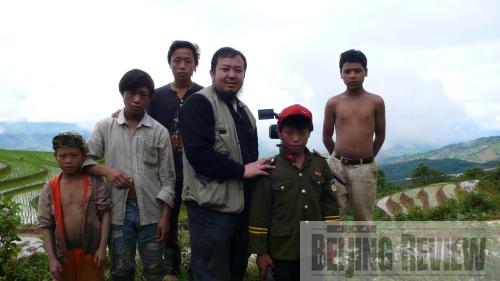|
 |
|
RECORDING HISTORY: Ouyang Bin (center), the cameraman and director of the documentary The Sixth Resettlement, poses for a photo with Kucong children and young men who appear in his film (COURTESY OF OUYANG BIN) |
A 2008 documentary on the Kucong people, an ethnic subgroup of China's Lahu ethnic group, The Sixth Resettlement, starts with a scene in which a TV is playing a 50-year-old documentary at a village market. People in the market are crowded around the small screen, some shouting excitedly when they recognize a family member or themselves.
"That man is my grandpa," said a middle-aged woman in the movie, suddenly standing up from the seated audience. Her pride soon turned into embarrassment when she realized that the Kucong people half a century ago were practically naked except for leaves or fur around their waists.
Without the knowledge necessary to live an agricultural life, the Kucong people traveled into the deep forests on the Ailao Mountain along China's border with Viet Nam. They collected wild fruits and hunted animals. They rubbed bamboo sticks to make fire.
Only the bravest Kucong people wore old clothes that they bartered from other ethnic groups living nearby. They hid in the grass by a path and waited for a passerby to trade their own clothes for fur or wild herbs the Kucong laid on the ground. Most Kucong people were too afraid to talk with any outsiders.
Tan Leshan's 96-year-old father planned the old documentary while Tan himself planned the new one. "Back in the 1950s, my father wrote a letter to the Ministry of Culture suggesting using video to record the traditional lifestyles of ethnic groups before they disappeared," said Tan, a professor of visual anthropology at Yunnan University.
His father's letter attracted attention from China's state leaders and was quickly approved. The filming of this new genre of documentaries in China, called "records of ethnic groups," lasted from 1957 to 1965 and became part of the country's unprecedented nationwide survey of ethnic minorities. But at that time China could not produce movie cameras or film. The government guaranteed cameras and film to shoot the documentaries by cutting down on fictional movies being made. Of the 15 documentaries produced, Tan's father participated in seven, which are about six ethnic groups in Yunnan.
These old documentaries turned into smash hits when they were screened in Europe in the 1990s, giving a boost to Yunnan University's East Asia Institute of Visual Anthropology, where Tan is the vice director. In 1999, the institute received funding from Volkswagen to start training programs for young Chinese visual anthropologists in partnership with German institutions. Tan wished to shoot new documentaries on people observed by his father, as a salute to China's first generation of documentary makers on ethnic minorities. The Sixth Resettlement is the second in the works.
"My father is pleased to hear about my plan to put the people he studied in the lens again. He thinks this is a good family tradition," Tan said. He said that in his childhood, he was intrigued by bows and arrows collected by his father from ethnic minorities and looked forward to seeing how they lived with his own eyes.
| 